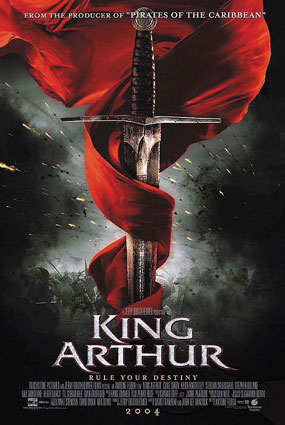
King Arthur

Purportedly the true story of King Arthur, this newest telling of the legendary fable develops the story as more reality than myth. There is no magic, no Connecticut Yankee, and no Camelot. Instead, Arthur and his men are minions of the fading Roman Empire who had been forced into servitude as boys. Now 467 A.D., Rome has decided to relinquish its occupation of Great Britain, promising freedom for the Knights of the Round Table upon completion of one last mission: to rescue a Roman family from a remote outpost. Assisted by the pagan Woads (including their doyen Merlin and a tenacious Guinevere), the group must flee the invading Saxons.
Helmed by music video director Antoine Fuqua, the film is fast-paced and offers plenty of action with primal (and believable) battle scenes. His vision has neither glamour nor romance, while the muted tones define the brutal and gloomy world. Further, the disguised special effects enhance rather than overdo the story. Producer Jerry Bruckheimer continues his streak as impresario extraordinaire, creating another big-budget extravaganza that both entertains and inspires. However, as with any historical film, purists will be annoyed by the implausibilities and distortion of fact.
Clive Owen, little-known on this side of the Atlantic, portrays Arthur as a kind-hearted but reluctant leader, torn between his duty to Rome and his hatred for their misdeeds; guiding his followers across a frozen lake, he becomes a medieval Moses who is both shepherd and liberator. Ioan Gruffudd, the captivating star of televisionís Horatio Hornblower series, plays a seething Lancelot who eyes Guinevere but never makes a move. Keira Knightley, the breakout star of Pirates of the Caribbean (also produced by Bruckheimer), is a Guinevere unlike any before; no longer a damsel in distress, she is a warrior cast from the Xena mold who promises Arthur not to let the barbarians rape him. Mads Mikkelsen and Stellan Skarsgard are suitably creepy as the lumbering Saxons. Unfortunately, the remaining knights are generally treated as extras who are never fully characterized.
As a sword epic, King Arthur succeeds where Troy does not. The cast members treat the story more seriously than a theme park attraction to-be, and the lesser-known faces appear more authentic to a period piece such as this. But the simple dialogue is devoid of any soul, and suggests the populace of the Dark Ages had little motivation but to bide their time until death. It is no wonder this period of little advancement would last for another thousand years. Yet, it is Arthur himself who begins to philosophize and bridges the gap between their antiquated mentality and more contemporary thought: "Home is not in some distant land, but in ourselves." Rating: 6 out of 10.